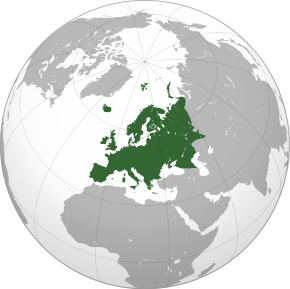Flag of Bulgaria
The flag of Bulgaria (Bulgarian: знаме на България, romanized: zname na Bǎlgariya, IPA: [ˈznamɛ nɐ bɐɫˈɡarijɐ]) is a tricolour consisting of three equal-sized horizontal bands of (from top to bottom) white, green, and red. The flag was first adopted after the 1877–1878 Russo-Turkish War, when Bulgaria gained independence. The national flag at times was charged with the state emblem, especially during the communist era. The current flag was re-established with the 1991 Constitution of Bulgaria and was confirmed in a 1998 law.
 | |
| Use | Civil and state flag, civil ensign |
|---|---|
| Proportion | 3:5 |
| Adopted | 1879 (first adoption) 27 November 1990 (readoption)[1] |
| Design | A horizontal tricolour of white, green and red. |
History
First Bulgarian Empire
In 866, Pope Nicholas I advised Prince Boris who had recently Christianized his people to switch from the practice of using a horse tail as a banner to adopting the Holy Cross.[2]
Later illuminated versions of the chronicles of John Skylitzes and Constantine Manasses depict the army of Khan Krum carrying flags either in monotone red[3], or red with a black border.[4] The army of Simeon the Great is also depicted carrying red banners of varying shape.[4] The Radziwiłł Chronicle also depicts Tzar Simeon I's army under a red flag in the 921-922 campaign against Byzantium, but the depiction of the Hungarian invasion of 894 featured the Bulgarian fortress of Drastar under a white flag with a crescent and a six-pointed star. Any pictorial representations of flags in the manuscripts mentioned above, regardless of the faction or time depicted, conform strongly to the overall illustration style used in each manuscript. In addition, none of those manuscripts dates to the time of the First Bulgarian Empire. The historicity of those flags is thus impossible to verify.
Second Bulgarian Empire
Depictions of Bulgarian flags can be seen on various portolan maps from the 14th and 15th centuries. On those maps, the flags commonly have a white or golden[5][6] background and depict either the insignia of the ruling House of Shishman[7], or unknown symbols[8][9] in red. Those drawings are markedly more diverse than the flags of the neighboring countries such as the Eastern Roman Empire, the Golden Horde or the Serbian Empire, which in the same maps are largely consistent.
Third Bulgarian state
After the liberation of Bulgaria following the Russo-Turkish War in 1878, the flag was described in the Tarnovo Constitution of 1879 as follows:
Art. 23. The Bulgarian people's flag is three-coloured and consists of white, green and red colours, placed horizontally.[10]
From 1947-1990 the emblem of the People's Republic of Bulgaria was placed on the left side of the white stripe. It contained a lion within a wreath of wheat ears below a red star and above a ribbon bearing the date 9 September 1944, the day of Bulgarian coup d'état of 1944 which led to the establishment of the People's Republic of Bulgaria. In 1971, it was changed so the ribbon bearing the years 681, the year of the establishment of the First Bulgarian Empire by Asparukh and 1944.
After the fall of Communism in 1990, the then-enforced Zhivkov Constitution was amended so the flag could be reverted to the pre-Communist era.[11] The new Constitution of Bulgaria, adopted in 1991, describes the Bulgarian flag as follows:
Art. 166. The flag of the Republic of Bulgaria shall be a tricolour: white, green and red from top, placed horizontally.[12]
A popular version of the flag, which has no official status, is also commonly known. It has the full coat of arms on the left of the flag, placed across the white and green fields only.[13]
Flag law
According to the Law for the State Seal and National Flag of the Republic of Bulgaria, promulgated on 24 April 1998:
Art. 15. (1) The national flag of the Republic of Bulgaria is a national symbol which expresses the independence and sovereignty of the Bulgarian state.
(2) The national flag of the Republic of Bulgaria is tricolour: white, green and red fields, placed horizontally from the top downwards. On fixing the national flag in a vertical situation of the carrying body the colours shall be arranged from left to right - white, green, red.
(3) The national flag is of a rectangular shape. The fields of the individual colours shall be equal in size and shall be situated along the horizontal of the rectangular.[14]
Colours
According to the Standardisation and Metrology Committee, the following are the required colours for use in the national flag:
| Colour scheme | White | Green | Red |
|---|---|---|---|
| Pantone textile[16] | Whiteness greater than 80% | 17-5936 TCX[17] | 18-1664 TCX[18] |
| Pantone[16] | Whiteness greater than 80% | 347 U | 032 U |
| CMYK[16] | 0/0/0/0 | 100/0/100/0 | 0/100/100/0 |
| Web colours[16] | #FFFFFF | #009B74 | #D01C1F |
| RGB[16] | 255,255,255 | 0,155,116 | 208,28,31 |
| RAL[19] | Safe | RAL 6024 | RAL 3028 |
Gallery
Flags of the First Bulgarian Empire
These flags derive from illuminated manuscripts dating from centuries after the end of the First Bulgarian Empire, and are ahistorical.
 War flag of Bulgaria under Khan Krum (early 800's) as depicted by Constantine Manasses (b.1130 – d.1187).
War flag of Bulgaria under Khan Krum (early 800's) as depicted by Constantine Manasses (b.1130 – d.1187). Flag of the Bulgar army in the Battle of Versinikia (813) in the Madrid Skylitzes.
Flag of the Bulgar army in the Battle of Versinikia (813) in the Madrid Skylitzes. Flag of the Bulgarian fortress of Drastar under siege by Hungarians in 894, as depicted in the Radziwiłł Chronicle.
Flag of the Bulgarian fortress of Drastar under siege by Hungarians in 894, as depicted in the Radziwiłł Chronicle..svg.png) Digital recreation of the flag depicted in the Manasses chronicle.
Digital recreation of the flag depicted in the Manasses chronicle.
Flags of the Second Bulgarian Empire
 Flag of Bulgaria on Pietro Vesconte's 1321 nautical chart
Flag of Bulgaria on Pietro Vesconte's 1321 nautical chart
 Flag over Varna on Guillem Soler's Portolan chart (c.1385)
Flag over Varna on Guillem Soler's Portolan chart (c.1385) Flag of Bulgaria on Battista Beccario's 1426 map
Flag of Bulgaria on Battista Beccario's 1426 map
Flags of the modern Bulgarian state
 Flag of Bulgaria (1879-1947, 1990-present). Valid since 27 November 1990.
Flag of Bulgaria (1879-1947, 1990-present). Valid since 27 November 1990..svg.png) Flag of Bulgaria (1947–1948)
Flag of Bulgaria (1947–1948).svg.png) Flag of Bulgaria (1948–1967). Valid since 27 January 1948.
Flag of Bulgaria (1948–1967). Valid since 27 January 1948..svg.png) Flag of Bulgaria (1967–1971). The design of the emblem has changed slightly from the previous version. Valid since 14 June 1967.
Flag of Bulgaria (1967–1971). The design of the emblem has changed slightly from the previous version. Valid since 14 June 1967..svg.png) Flag of Bulgaria (1971–1990). The indication of 681, the year of the establishment of the First Bulgarian Empire by Asparukh, was added to 1944. Hoisted for the first time on 21 May 1971.
Flag of Bulgaria (1971–1990). The indication of 681, the year of the establishment of the First Bulgarian Empire by Asparukh, was added to 1944. Hoisted for the first time on 21 May 1971.
.svg.png) Bulgarian People's Army war flag from the Communist era. The motto in Bulgarian means "For our Socialist motherland".
Bulgarian People's Army war flag from the Communist era. The motto in Bulgarian means "For our Socialist motherland".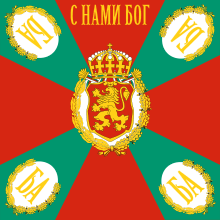 Current Bulgarian war flag, similar to Bulgarian war flags from period 1880s–mid 1940s. The motto in Bulgarian means "God is with us".
Current Bulgarian war flag, similar to Bulgarian war flags from period 1880s–mid 1940s. The motto in Bulgarian means "God is with us".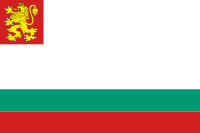 Naval ensign of Bulgaria
Naval ensign of Bulgaria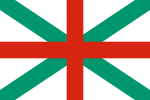 Naval jack of Bulgaria
Naval jack of Bulgaria
.svg.png) Naval ensign of Bulgaria (1879–1949)
Naval ensign of Bulgaria (1879–1949).svg.png) Naval ensign of Bulgaria (1949–1955)
Naval ensign of Bulgaria (1949–1955).svg.png) Naval ensign of Bulgaria (1955–1991)
Naval ensign of Bulgaria (1955–1991)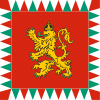 Standard of the Tsar, used by approx. 1937 to 1946
Standard of the Tsar, used by approx. 1937 to 1946
References
- Whitney Smith. "Flag of Bulgaria". Encyclopædia Britannica. Retrieved 2017-12-08.
- "Internet History Sourcebooks". sourcebooks.fordham.edu.
- "Madrid Skylitzes" (PDF) (in Ancient Greek). World Digital Library. Retrieved 2019-06-30.
- "Vatican copy of the Manasses Chronicle" (in Church Slavic). Vatican Library. Retrieved 2019-06-30.
- "Map Guillem Soler, c. 1380". French National Library. Retrieved 2019-06-30.
- "Map of Battista Beccario, 1426". Bavarian State Library. Retrieved 2019-09-23.
- "Map by Angelino Dalorto, c. 1325". Retrieved 2019-10-25.
- "Map by Pietro Vesconte, c.1325". Vatican Library. Retrieved 2019-06-30.
- "Map by the Pizzigani brothers, c.1367". Retrieved 2019-06-30.
- "Tarnovo Constitution of 1879" (in Bulgarian). Juridical Encyclopedia. Archived from the original on 2007-09-11. Retrieved 2007-09-15.
- "Understanding the Bulgarian Flag". Information Bulgaria. Retrieved 2017-12-08.
- "Constitution of the Republic of Bulgaria". National Assembly of the Republic of Bulgaria. Retrieved 2007-09-15.
- Unofficial flag Archived 2014-04-08 at the Wayback Machine, taken from 2013 Bulgaria Summer Protests, Darik News, 26 June 2013, and unofficial flag, taken from Protests in Bulgaria: the unnoticed uprising, TheConversation.com, 24 Jun 2013. Both retrieved 27 Jun 2013.
- "Law for the State Seal and National Flag of the Republic of Bulgaria". National Assembly of the Republic. Retrieved 2007-09-15.
- bg:Национално знаме на България
- Знаме. "Институционална идентичност на българската дъжавна администрачия". identity.egov.bg. Archived from the original on January 22, 2020. Retrieved 17 November 2019.
- PANTONE. "PANTONE 17-5936 TCX Simply Green - Find a Pantone Color - Quick Online Color Tool". Pantone.com. Retrieved 12 December 2017.
- PANTONE. "PANTONE 18-1664 TCX Fiery Red - Find a Pantone Color - Quick Online Color Tool". Pantone.com. Retrieved 12 December 2017.
- Government of Bulgaria (2005). "Bulgaria's National Flag". Archived from the original on 2009-02-08. Retrieved 2007-11-09.
External links
| Wikimedia Commons has media related to National flag of Bulgaria. |
- Bulgarian Heraldry and Vexillology Society (in Bulgarian and English)
- Bulgaria at Flags of the World
- Law for the State Seal and the National Flag of the Republic of Bulgaria
- About Bulgarian national symbols
- Voynikov, Ivan. "Part II. The Bulgarian flag through the centuries". History of the Bulgarian State Symbols (in Bulgarian).
